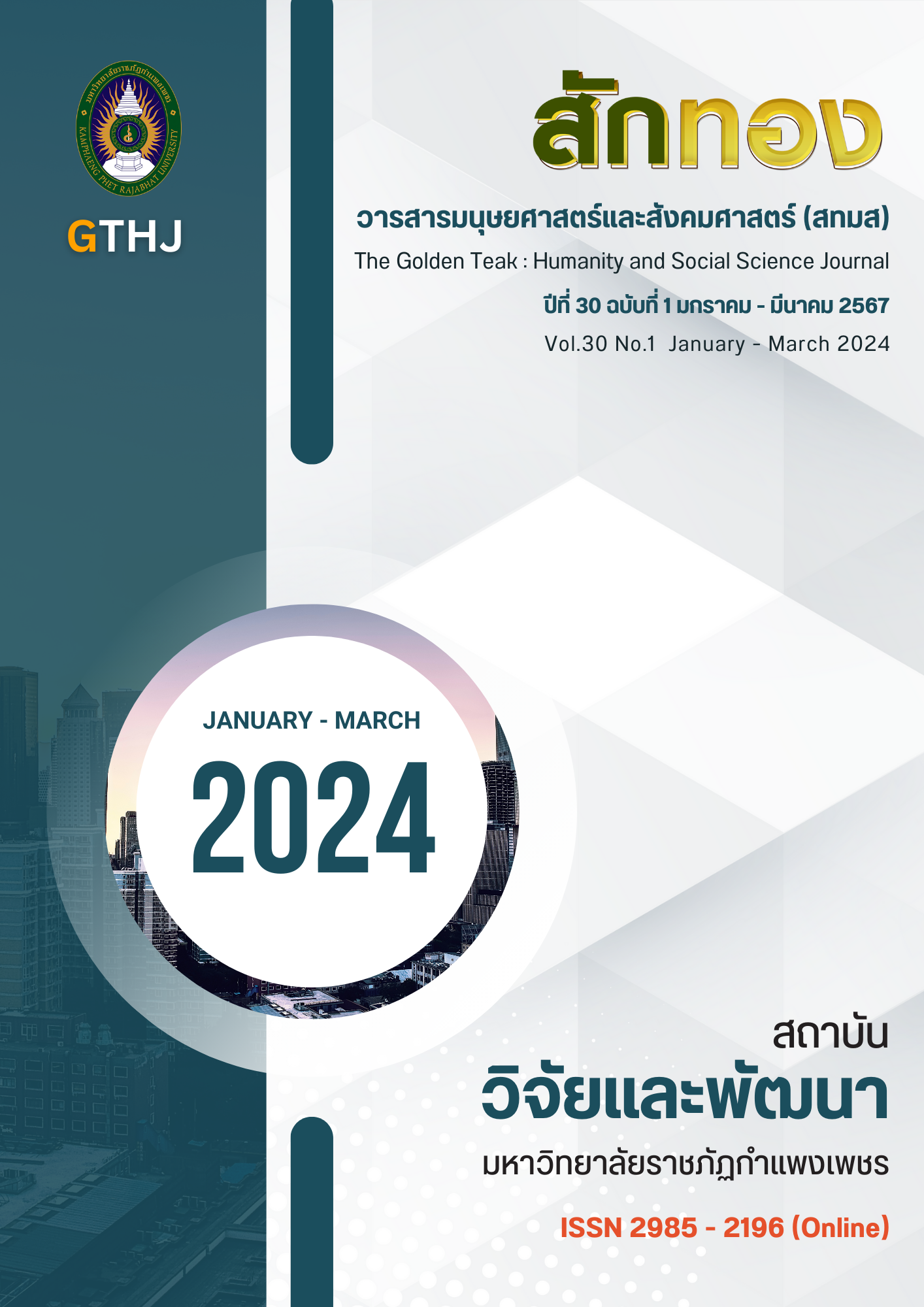The Development of a Learning Management Model Based on Sociocultural Theory to Enhance English Communicative Skills for Lower Secondary School Students
Main Article Content
Abstract
This study aimed to 1) construct a learning management model and study its qualities to 1.1) construct and estimate the suitability of a learning management following the opinion’s experts, 1.2) study the effectiveness index of a learning management model; 2) implement a learning management and study its results to as followed; 2.1) compare English communicative skills by comparing pretest and posttest scores 2.2) study interpersonal relationship between learning; and 3) study students’ satisfaction toward the learning management model. The research consisted of 3 steps of research and development processes: 1) constructing a learning management model which was evaluated by 5 experts and studying its qualities by implementing it in a pilot group of 35 Mattayom 3 students to study an effectiveness index; 2) implementing the learning management model with 23 Mattayom 3 students of Wangngiuwittayakom School by using specific sample; and 3) studying students’ satisfaction toward the learning management model. The research results were as follows: 1) The learning management model consisted of principles, goals, contents, instructional processes, and measurements evaluations. The learning management model consisted of 4 steps; 1) Presentation 2) Interaction 3) Scaffolding and 4) Production. The experts agreed to the quality of the learning management model at a high level. The effectiveness index of the learning management model was .5234. 2) When the learning management model was implemented, it was found that: 2.1 The students’ communicative skills after learning through the learning management model were higher than before learning at the .01 level of statistical significance. 2.2 The students’ interpersonal relationship during learning was at a high level. 3) The students’ satisfaction toward the learning management model was at a high level.
Article Details

This work is licensed under a Creative Commons Attribution-NonCommercial-NoDerivatives 4.0 International License.
บทความที่ได้รับการตีพิมพ์เป็นลิขสิทธิ์ของวารสาร สักทอง : วารสารมนุษยศาสตร์และสังคมศาสตร์ สถาบันวิจัยและพัฒนา มหาวิทยาลับราชภัฏกำแพงเพชร
ข้อคิดเห็นใดๆ ที่ปรากฎในวารสารเป็นวรรณกรรมของผู้เขียนโดยเฉพาะ ซึ่งมหาวิทยาลัยราชภัฏกำแพงเพชรและบรรณาธิการไม่จำเป็นต้องเห็นด้วย
References
Bailey, A.C. (2013). Understanding Perspectives of English Language Learning and Assessment Practices : A Mixed-Method Embedded Study. A Dissertation for the degree Doctor of Education in Educational Leadership in Curriculum and Instruction.
Bamroongkit, S., Wijakkanalan, S. & Kwangsawad, T. (2019). Blended English Teaching Model Improving Communicative Skills. KKU Research Journal of Humanities and Social Sciences (Graduate Studies), 7(2), 59-69. [In Thai]
Boonprasetpon, P. (2009). The development of an English language instructional model based on experiential learning for higher vocational diploma students. Doctor Thesis, Ph.D., Naresuan University. [In Thai]
Cacic, S. & Kaewurai, W. (2018). The Development of a Learning Management Model Based on Communicative Language Teaching and Task Based Learning to Enhance Communicative Competence for Grade VI Students. Journal of Education Naresuan University, 22(2), 214-226. [In Thai]
Itsaraprida, P. & Thongwiset, T. (2017). Teacher-Student Interpersonal Behavior: Theoretical Model, Assessment, and Research Review. Journal of Education Studies, 45(3), 206-220. [In Thai]
Ministry of Education. (2018). The Basic Education Core Curriculum B.E. 2551 (A.D.2008) : Foreign Languages Department. Bangkok : Ministry of Education. [In Thai]
Naruponjirakul, S. (2017). The Development of an English Instructional Model Based on Scenario-Based Learning to Enhance English Ability and Self-Efficacy of Undergraduate Students. Doctor Thesis, Ed.D., Dhurakij Pundit University. [In Thai]
National Institute of Educational Testing Service. (2019). Ordinary National Educational, Test : O-NET Mattayom 3 Semester 2018. [Online]. Available : http://www.newonetresult.niets.or.th/AnnouncementWeb/Login.aspx [2019, April 30]. [In Thai]
Office of Basic Education Commission. (2014). The Common European Framework of Reference for Languages (CEFR) for Secondary Level. Bangkok : English Language Institute. [In Thai]
Pérez-Sabater, C., & Montero-Fleta, B. (2014). Pragmatic competence and social power awareness: The case of written and spoken discourse in non-native English environments. International Journal of English Studies, University of Murcia, 14(2), 21-38.
Phadvibulya, T. (2006). A Development of a hybrid network technology-enhanced language learning model based on social constructivism approach for promoting EFL learner autonomy. Doctor Thesis, Ph.D., Chulalongkorn University. [In Thai]
Plubpla, P., Jaturanon, W. & Chaisuriya, A. (2017). The development of an English language instructional model based on experiential learning and cooperative learning for promoting communicative competence of sixth grade students. Graduate Studies Journal, 14(64), 229-237. [In Thai]
Pongpetra, S. (2010). Factors Affecting on Interpersonal Relationship with Friends of the Fourth Level, Secondary Grade 4-6 Students at Sarasas Ektra School in Yannawa District, Bangkok. Master of Education, Srinakharinwirot University. [In Thai]
Preedeekun, A., Meejaeng, A. Ngaorangsee, K. & Kaewurai, W. (2011). The development of a listening and speaking English skills instructional model based on communicative competences of Rajabhat University students. Journal of Education Naresuan University, (Special), 155-175.
Salae, A., Rungrattanakul, D., Kaewurai, W. & Wattanathorn, A. (2013). The development of a learning model based on sociocultural theory to enhance English communicative ability for upper secondary school students in three Southern Border provinces. Journal of Education, Prince of Songkla University, Pattani Campus, 27(1),
-135.
Thanapakit, A. (2012, November 22). Thai people are brave Resulting in speaking English second to the world's plum. Daily News, p.8. [In Thai]
Wuttiwongsa, N. (2014). Motivational Strategies: Enhancing English Language Skills. Executive Journal, 34(1), 88-97. [In Thai]
Vygotsky, L.S. (1978). Mind in society: The development of higher psychological process. Cambridge : Haward University Press.


